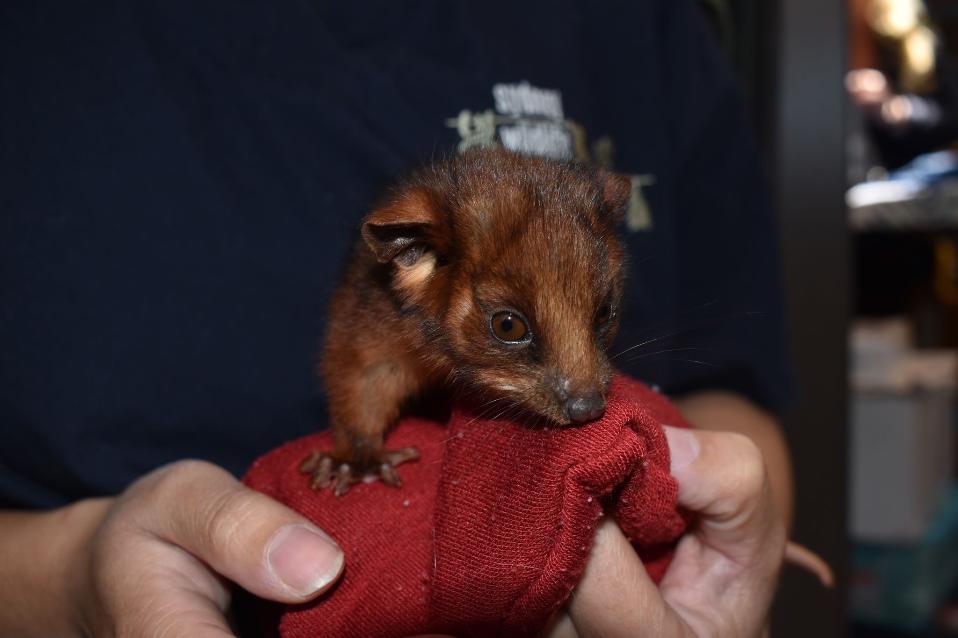Spring into Action: Safeguarding Wildlife While You Clean
by Lynleigh Greig OAM
Plus: Care Unit: Exciting Collaboration Alert - Wanda meets Matilda!
and
Pittwater Animal Hospital's Cakewalk for Sydney Wildlife Rescue

Orphaned ringtail joey. Photo by Ainslie
Spring is a very busy time for wildlife. Joeys are starting to emerge from their mums’ pouches, baby birds are donning their L-plates and learning to fly and reptiles are starting to shake off their winter slumber to seek some sun and ‘special cuddles’…
Simultaneously, we humans seem to feel the need to start “Spring Cleaning” as soon as the weather starts to improve. But remember - cleaning out the cobwebs and wiping down the windows can be very hazardous for our wild critters.
Gardening in particular can present all kinds of challenges. Blue-tongue lizards are often hidden from sight in long grass and they become victims of lawn-mowers and whipper-snippers on a regular basis. Try to walk around your lawn and check for creatures before turning the blades on it.
Don’t trim any branches until you have checked thoroughly for nests or dreys (possum homes). Tree hollows are also prime real estate and terrified animals will bound out at the sound of a chainsaw! Back-riding marsupial babies may drop off their fleeing mothers in fright.
Sweeping away leaves and moving old logs may unearth tiny reptiles that are still in winter dormancy. Try to wear thick gloves when gardening and do everything slowly and gently so as not to harm sleepy little creatures.
Don’t fire up the barbie without checking for squatters first! The outdoor barbecue is often considered the Hylton of winter accommodation whilst not in use.
We often get called out for possums and pythons in outdoor kitchens.
Spotless windows might be nice for you, but they become a source of concussion for birds! Placing visual obstructions such as tape across the windows will prevent avian aviation accidents (try saying that after 3 Tawny Grogmouth beers!).

Tawny frogmouth. Photo by Bronwyn
Cleaning out the attic might become a whole lot more adventurous if you discover some new furry tenants. Sugar gliders have been known to enjoy loft-style attics so if you hear loud burbling sounds in grandma’s old suitcases, be sure to move things slowly and carefully to prevent squashing tiny paws!

Feathertail glider joey. Photo by Kobie
Be careful when opening outdoor umbrellas as these can be considered cute condos for microbats. If there are tiny tenants in your brolly, wait until nightfall to open them up and keep them open to deter the little flappers from returning.

Baby bat
Garages, car-ports, outdoor pots, pool filter boxes, building rubble, mulch piles - all our forgotten objects become winter sleeping quarters for all types of wildlife.
If you inadvertently injure a cute claw or a tiny tail whilst getting your place spic-and-span, call Sydney Wildlife Rescue straight away on 9413 4300.
NEVER attempt to touch bats or snakes. These animals require trained and professional rescuers only.

Red-bellied black snake sleeping in a drawer.
Sydney Wildlife Mobile Care Unit: Exciting Collaboration Alert - wanda meets matilda!
Our Mobile Care Unit team was thrilled to have the incredible opportunity to join forces with the fantastic team at Byron Bay Wildlife Hospital this past Friday, September 6.
Amid the challenges posed by natural disasters and increasing threats from human activity, both teams stand united in our mission to rescue and rehabilitate affected wildlife. Together, we're committed to being a beacon of hope for our beloved critters.
Their impressive mobile wildlife hospital met up with our trusty little van and our rescue ATV, creating unforgettable moments that were captured in stunning photos!
Together, we’re a united front in wildlife rescue, pooling our resources and expertise to provide the best care for our beloved critters during this critical time. A special thank you to our wonderful Anne from MediDivert, who generously provided medical supplies for the Byron Bay team to take back home.
A huge shout out to The Pet Specialists, Northside Emergency Veterinary Service at Terrey Hills and AVES - Avian and Exotics Service for graciously hosting this much-anticipated meet-up!
Photo credit: Margaret and Peter Woods
To find out more visit: https://www.byronbaywildlifehospital.org
Pittwater Animal Hospital's Cakewalk for sydney wildlife rescue
Just when you thought vets couldn’t get any cooler… 🩺
And just when you thought Pittwater Animal Hospital couldn’t get any more awe-inspiring… 🐾 🏥
They go ahead and pull out all the stops to make all of August an unbelievable fundraising extravaganza for Sydney Wildlife Rescue!
Their dedicated vets and staff baked up a storm every Thursday for their fabulous Friday Bake Sale Days 🎂 They organised a gigantic raffle AND tackled an impressive 50km “Walking for Wildlife” trek to raise funds for our beloved wildlife 🦅🦉🦇🦎🐢🐍🦘




A very special shout out to Dr. Juliet, who selflessly volunteers in the Mobile Care Unit whenever she can. Her passion for wildlife is truly inspiring, and we can’t thank her enough!
Thank you, thank you, thank you! 🙌 Your incredible donation will help us secure life-saving equipment for the Mobile Care Unit and provide food and housing for many wild babies coming into care this Spring.

Dr Steph, Dr Sang, Dr Margot, Susan, Lynleigh, Dr Juliet, Dr Heidi and the awesome Pittwater Animal Hospital team.
Sydney Wildlife Rescue does not receive any government funding to support the rescue, care, supply of medical services, medicines or transport of wildlife rescue.
If you can support their work, please make a donation at: https://www.sydneywildlife.org.au/donate
If you'd rather donate via bank deposit, their Public Gift Fund bank account details are:
Name: Sydney Wildlife
BSB: 062 028
Account:1043-1932
You'll automatically get a tax receipt if you use paypal or credit card. If you make a bank deposit, please email our treasurer (treasurer@sydneywildlife.org.au) so that a tax receipt can be sent to you. All donations over $2 are tax deductible.